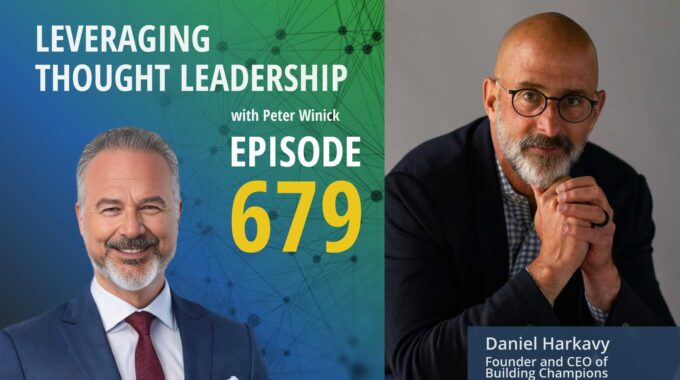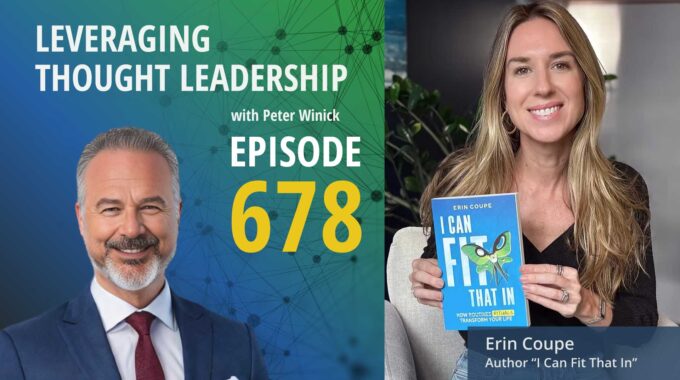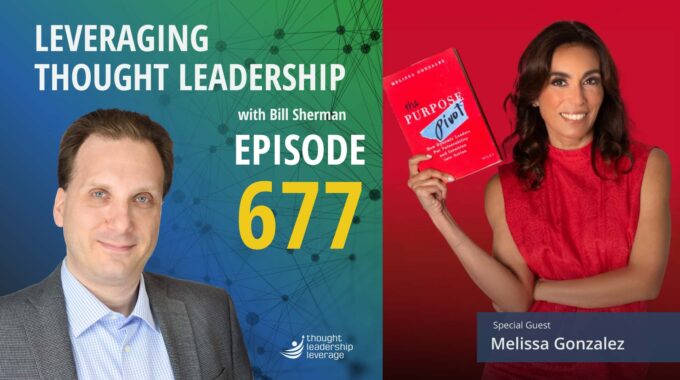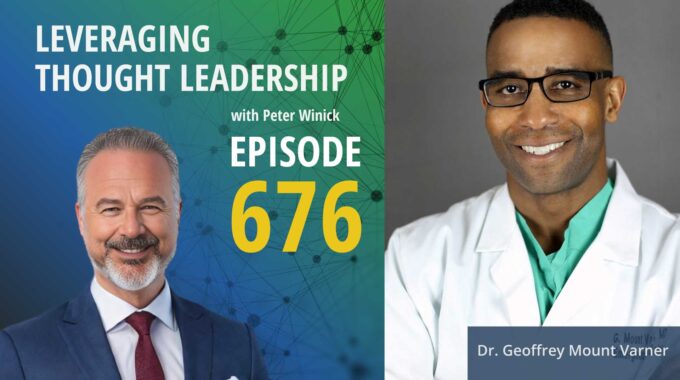A roadmap for leaders who want to multiply their impact — not their workload. This…
The Ghostwriter’s Blueprint for Success | Phil Simon
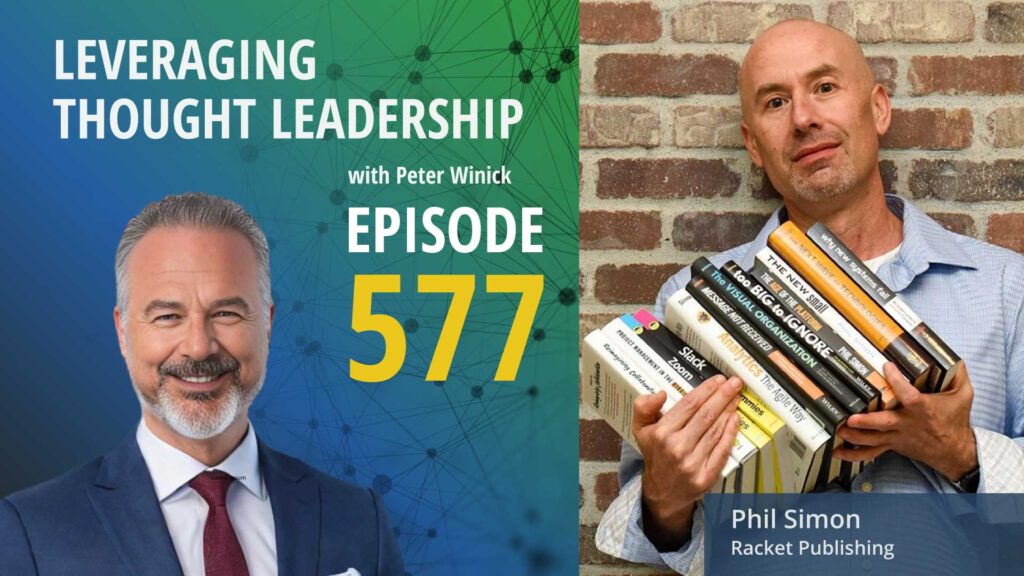
Embracing Innovation in Writing and Publishing
A conversation with Phil Simon about being a ghostwriter and running a hybrid publishing house.
In this riveting episode of Thought Leadership Leverage with host Peter Winick, we dive into the world of non-fiction with Phil Simon, a multifaceted writer, ghostwriter, speaker, and podcaster. Phil shares his journey from a college professor in business information systems to becoming a prolific author and the founder of a hybrid publishing company. He explains his dual role as both a creator and coach, helping others craft their books and platforms while avoiding common pitfalls.
Phil recounts his transition into writing in 2008, which ignited his passion for the craft and led to the establishment of his own publishing company. His unique perspective as an author, ghostwriter, and publisher enables him to guide others effectively. He emphasizes the importance of finding the right fit with clients, setting clear expectations, and ensuring that the client’s voice shines through while adhering to effective business writing principles.
Discussing the ghostwriting process, Phil highlights the critical need for compatibility and clear communication with clients. He shares insights into the evolving publishing landscape, noting the rise of hybrid publishing as a cost-effective and rewarding alternative to traditional publishers. Authors now have more control and potential for higher rewards, balancing the risks with substantial marketing and support efforts.
Phil also delves into his personal intellectual property, which he proudly owns under “Racket Publishing.” This ownership allows him to explore various avenues, such as international translations and teachable courses, without intermediary restrictions. He discusses innovative business models that leverage the credibility of a published book, including bespoke versions for corporate clients, custom training, and webinars.
Phil’s experience underscores the chaotic yet rewarding nature of thought leadership and publishing. His advice for aspiring authors and thought leaders is to embrace the non-linear path to success and capitalize on the multifaceted opportunities a book can provide.
Three Key Takeaways:
Embrace Hybrid Publishing: Phil Simon emphasizes the advantages of hybrid publishing over traditional routes. This model offers authors more control, potential for higher rewards, and flexibility, while still maintaining professional quality. Hybrid publishing allows authors to manage costs and directly benefit from their work.
Find the Right Fit in Ghostwriting: The importance of compatibility and clear expectations in ghostwriting is crucial. Successful partnerships hinge on mutual understanding and clear communication, ensuring the final product resonates with the intended audience and meets client expectations.
Leverage Your Book for Broader Opportunities: Owning your intellectual property opens up diverse monetization avenues. Phil discusses how a book can elevate your brand, allowing for additional revenue streams through custom training, webinars, and bespoke book versions for corporate clients. Embracing these opportunities can significantly enhance your thought leadership platform.
If you want to learn more about the Changing Landscape of Publishing be sure to check out this video by Peter Winick.
Transcript
Peter Winick And welcome, welcome, welcome. This is Peter Winick. I’m the founder and CEO at Thought Leadership Leverage. And you’re joining us on the podcast, which is leveraging thought leadership today. Should be interesting. My guest is Phil Simon, and he’s hard to put in or labels. So amongst the things that he does, he is a writer. He is a ghostwriter. He’s a speaker. He’s a podcaster. But what I thought would be interesting today, given sort of where he sits is really talk about a couple things. Number one, what he does, his platform and then how he also helps others develop their nonfiction books and platforms and such to take out in the marketplace. Because it’s and at least to my experience, fairly rare that someone’s on both sides there. So welcome aboard. Phil.
Phil Simon Hey Peter, thanks a lot for having me. And yeah, that’s a fancy way of saying that I’m, either unable to focus or to use a 50 cent word, peripatetic.
Peter Winick Ooh, that’s a Googleable word.
Phil Simon It is a Googleable a word.
Peter Winick Cool. And for those of you, under a certain age, there used to be things called the dictionary, that we would go to and look those things up, but, I don’t even know where those are anymore. So give us a little bit of the, the Phil story, because you and I were trying the other day, it was really to me, it was really interesting in terms of your path, your career, how you got here. Because no, nobody wakes up and says, okay, here’s the plan. And then bang, here we are.
Phil Simon No, you. When I was a college professor teaching in the business school Department of Information Systems up until about four years ago, I joked that no one had a worse pedigree in the department than I because I’ve got a master’s in industrial labor relations. I used to work in HR. I realized that I was horribly suited for that. My boss doesn’t like me. Why didn’t I get the promotion was so. But they used to call left brained. But I was pretty good at technology data systems. I went to Carnegie Mellon so there. Even got college. Know how to the poets know how to code. So I decided to, in 2008 to start writing. It became my first book. I liked it, I thought that didn’t completely suck at it. A good things happened. So I’ve written a few books and then decided to start a hybrid publishing company. And that put out six books, two of which were my own. And then, I started another one when I left Arizona State University in 2020. And we’ve done four books, one of which I Ghost Road, three of which I wrote. I’m ghostwriting a book now. So yeah, I sit on both sides of the aisle, and as a ghostwriter slash book coach, I want to help people avoid some of the mistakes that I’ve seen others make and that I’ve made over my career. So that’s me in a pretty big box.
Peter Winick Let’s talk about the ghostwriting relationship experience, right? Because I’ve been around that world for a long time. And one of the things that, just unlike in almost any other profession, that’s really strange is, you know, if on paper, I was looking to hire, an engineer, a coder, CFO or whatever, you look at their pedigree, you look at their history. Where have they done? You need to go. Okay, cool. They’ve got the chops. Let’s rock and roll. What I’ve seen in the ghostwriting world is pedigree matters, like ish. But it’s that intangible. Like, you know, I sit down with you and you remind me of my seventh grade history teacher, and I don’t like you, and I don’t know why. So therefore, the relationship shot. Or like, there’s an irrational reason for that type of relationship, which is fairly intense and fairly intimate to work or not to work, that’s beyond control to some degree. So can you touch on that, or am I, am I not to my own point? No, no.
Phil Simon I it reminds me a lot of my days as a software consultant in the arts. And there were times in which I sat down first day and I immediately clicked with a client. Right. They said, you’re a straight shooter. You cut through the bullshit. You tell us what we need to do without the jargon. And it worked out well. And then there are other times in which I would bring the same person, I thought, and it was within two weeks, get this guy out of here. I think he’s exactly the wrong person. So my approach to ghostwriting is very similar. My goal is not to irritate you. Hopefully we can be friends, but you’re hiring me to do a job. And I’ve said this dozens of times in the ghostwriting work that I’ve done. I’d much rather have you be angry at me before. When we can fix it up or when we can’t.
Peter Winick Yeah. Yeah. So what tips would you give someone that is in the market for a ghostwriter? And let me just sort of expand on that question. So there’s two pieces that one is. How do you find fit. Like there is a kind of a dating piece to it. And then the other is I think there’s also confusion in the marketplace. Maybe there’s a two questions around, well, what does a ghostwriter do? Right. From someone that I could leave voicemails to when they create a book, to someone that I spar with, like talk to both of those, maybe. How do you get the relationship to work and then what are the expectations around?
Phil Simon Well, hopefully at a high level. Either your client likes your writing, because I know that you can try to put yourself in the voice of another person, but I just would argue that for nonfiction, I don’t want to speak about memoirs or about fiction. There are certain rules, as you know, that you’d want to follow, irrespective of the title of the book. So if you use a lot of passive voice and jargon, long, confusing sentences, you’re not going to resonate with readers. And then if the book doesn’t do well, that is it, the ghost writer’s fault. And you don’t want to have that constant back and forth. So in the most recent book that I completed, my client hired me specifically because she loved my book Reimagining Collaboration. She said, I’d love to do that along the lines of our topic. So there’s that. I with Racket Publishing my little hybrid outfit. I certainly can produce a manuscript, and then you can take that to Greenleaf or Amplify or Page two or the other large micro publishers. But. I actually employ a team much like they do. So if you want to work with me the entire time, then yeah, I know a very talented couple of designers and editors and indexers and e-book conversion folks, so we can scale up and scale down as needed. And then I can also manage the project, because if you’re trying to work backwards from a particular date, then the manuscript is an important part of it. But it’s hardly the only part. Plus there’s the marketing aspect as well. So to be starting these hybrid publishing companies isn’t that much of a stretch, because I’ve done a lot of these things either independently or with traditional publishers. And I could tell you the pros and cons of each. I was recently speaking with someone on LinkedIn who had signed up with a traditional publisher, but this had an interesting wrinkle in the contract, so the royalty rates were pretty standard. But there was a 3000-book minimum in the first year. And when I was speaking with this person.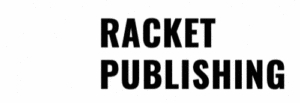
Peter Winick Meeting, just to clarify, meaning the author had to buy it. Yeah. I feel like a team that I call I call that the words to both worlds clause where, oh, you know.
Phil Simon 100% because you’re taking.
Peter Winick All the financial risk, right. And then on the royalty side, it’s the crappy royalty of a tradition right.
Phil Simon Now, if you’re an acquisitions editor at insert name of Big Publisher and you’re dealing with a first time author, why wouldn’t you do that? Right? Because it’s basically heads or tails you lose. And that if the book doesn’t sell beyond the 3000, then you have to write a check. And even if it’s discounted 50%, they’re still going to make their money. Yeah. I’m explaining to this person that there are alternatives, which again, 15 years ago I didn’t know nearly as much about. So I would have probably fallen for that. And you see this sometimes with Forbes books, right? They’re going to charge you $100,000 because they can put Forbes books on the cover, when in fact you can work with reputable folks who charge a lot less. And yeah, you’ve got that brand. But I’ll just ask you point blank, have you ever been to a bookstore and said Forbes Books? Oh, I don’t know the author or the title, but I have to buy the next. It’s not a car, right? Some people are very.
Peter Winick And loyal.
Phil Simon But I’ve never now but just pick on Forbes book. I’ve never walked over that bookstore and said, oh, I have to have whatever’s next from Penguin.
Peter Winick Right. Well, but I but I would also I would say the same thing in that how are books read today? It’s largely on a on an electronic device. I think I’m one of the only dorks left that when I open the Kindle to the book, I skim back to all the filler pages because I’m curious who the publisher is. Versus 99.9% of the world just wants to get to, you know, they were the best of times. They were the worst of times. Why would they care about that? I’m curious. Right. So it’s not like, oh well, oh, that’s a Wiley author versus a Forbes author versus a page two author. Therefore they represent X in the marketplace to me.
Phil Simon Yeah. It seems like many authors maybe get lured in at first to any standard book deal. But once they realize that again, by and large. And we saw this a couple weeks ago with that Publishers Weekly article detailing when the Department of Justice subpoenaed, I think it was execs from Penguin Random House, just how few books burned out and how little authors actually could expect to receive in terms of marketing support from the folks there. Yeah, not surprising to me that many of them kind of scurry over to the other side and they realize, to your point from before, Peter, if I’m going to take all the risk, I might as well get a lot more of the reward.
Peter Winick Yeah. And if you’re enjoying this episode of Leveraging Thought Leadership, please make sure to subscribe. If you’d like to help spread the word about our podcast, please leave a five-star review at ratethispodcast.com/ltl and share it with your friends. We’re available on Apple Podcasts and on all major listening apps as well as at thought leadership leverage.com/podcast.
Peter Winick I want to flip now to the other side because this is where I think you’re really in a unique place. So, you know, we’ve talked about ghostwriting you serving your clients as a ghostwriter. But now, you know, let’s talk about Phil World. You’ve got your own platform, you’ve got your own thought leadership. You’ve got your own IP. Tell me a little bit about where that came from and what you’ve done with it, and what you’re going to continue to do with it.
Phil Simon I love the fact that if I write something now under the bracket in print, or what was before the motion in print, it’s mine. I can do whatever I want with it. If I want to work with a company like Drop Cap to try to arrange for international translations of the book. Yeah, I could do that. If I don’t like the terms, I can say no when I’m working with a traditional publisher. Depending on the deal, I might just get a cursory FII email or in the case.
Peter Winick But those are business issues. Where I was going is, is it give me a sense of the essence of your thought leadership and collaboration.
Phil Simon Yeah, I was getting there, but in a circuitous way. So for example, with reimagining collaboration, which was a book number 11. I didn’t have to sweat if I wanted to record a teachable course or work with some other company, and I was violating the terms of my contract if I wanted to do. And I’ve never really done a proper sequel to a book, but if I wanted to do re-imagining collaboration again, I would not have the competing works clause right that you’d have to deal with. So I love the fact that I’ve got the freedom to do really whatever I want with my IP, whereas when I’ve worked with traditional publishers, if I did want to put out some of my content for free, yes, they’d say, sure, put out of a sample an excerpt of a chapter or something like that. But I’d have to worry about violating that. But no, I had no qualms about turning my content into workshops, into online courses, even doing things like creating a bespoke version of one of my books. So my previous book, Low-code no code, no code, low code, excuse me, the Citizen Developers and the Surprising Future of Business Applications. I reference a lot of software vendors there. If the VP of marketing or the CMO of the company said we’d like it all in version of this, with our CXO writing a foreword to slap our company logo on the front. Again, that’s something that I can do without having to clear it with either my agent or the acquisitions editor, my publisher, and I feel like it’s a lot cleaner. So this whole notion of agency theory, I’m a big believer that if traditional publishers and I think we’ve seen this with a few of them trying to get into speaking as well. But if I do a speaking gig for X number of dollars. And I have books there that they bought in advance. The publisher typically isn’t getting a cut of that speaking fee like a speaker bureau would. So if you remove those folks, then I feel like it’s a lot cleaner. You don’t have to ask for as much permission. It’s a lot riskier. You have to wear a few different hats.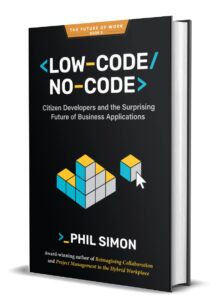
Peter Winick Yeah.
Phil Simon You also don’t have to ask permission, to get.
Peter Winick So let’s stay with that for a second and or expand on that from the standpoint of business models. Right. So you’ve got an idea. You’ve got ideas. You put it in a book, you know, you know, whatever rainbows and unicorns, the book becomes a success, right? For various reasons. What are the underlying business models that you’re seeing today. So obviously speaking is a pretty standard model. Everybody wants to be a speaker, right? That’s what you do. But what are the how are you as an example, either firsthand or seeing with your clients that you ghostwrite for innovatively monetizing their thought leadership?
Phil Simon I mean, you hit on some of the standard ones. The notion of a bespoke version of a book is really interesting. I feel like I’m certainly not the only person to have thought of it, but when I work with some clients, I said, look, this is another thing that you can do for a relatively small amount of money with significant upside. Certainly as a, supplement to speaking. So let’s say that you want to speak at a conference and you’d like to get, I figures. Well, they’re only offering an honorarium, but what if they either a bought a certain number of books, which you can discount because you’ve done it? Yes. So if it’s a $25 paperback, you could have it printed, shipped for 7 or $8, depending on a bunch of factors. But then if you charge them 12 or 13, they’re getting it at a 50% discount, but you’re still making money. And whether you get $12,000 for speaking or $12,000 from book sales, that money still spends. I also found that on a personal level, and again, I’m sure I’m not the only person to do this, but I wrote 14 books. I basically know where the bodies are buried. And I launched a software product about, 5 or 6 weeks ago called the Bracket Hub. It’s based on notion. It’s a very comprehensive e-book management system that I can either use with my clients, and it is kind of a lot at first, but there is a method to the madness or just in terms of a business model. I’ve actually had some conversations with some ghost writers and some smaller publishers about basically licensing this. I will compare myself, Peter, on a much, much smaller scale to some something like Amazon Web Services. So once hands on circa 2005 2006 figured out how to create all this compute power, all these APIs and powerful services for their e-commerce business, they could let all that vanish into the ether or wait for it. They could sell it. In which case they say that AWS generates 80 to 90% of Amazon’s profits, despite being smaller than the commerce or retail side of the business. So because I learned how to do books so well, I can charge what I think is a pretty fair rate.
Peter Winick That’s unique to you, because on the publishing side, what I’m saying is put on your other hat, fill the thought leader how you know. So let’s say I fell in love with reimagining collaboration. I, you know, of course, how would I not write and then, you know, reach out to you. And I’m an SVP and a financial services company and said, wow, that was awesome. And we need to do that here. And it’s costing us money because we’re not growing or we’re not getting the best stuff to market as a result of lack of collaboration internally. How can you help me fill? And the answer isn’t just buy a bunch of my books, right?
Phil Simon Like absolutely not. I mean, I just submitted a quote to a company a couple of weeks ago to do some custom training, maybe a webinar consulting. And if you already offer those services, a but you’ve written a well-received book and think about it this way, Peter. And again, it’s nothing I’m sure you have to discuss with your own clients person a smart cookie, decent website, you know, some nice videos, person B as all that stuff and a book. Right. Which person do you think in theory, has got that credential? And not to mention things like passive income. I’m I am I’m ceaselessly amazed at the randomness of the queries I would get sometimes over LinkedIn or my website, and sometimes they’re not even in the same country. I was a couple a couple of days ago, I finally received the international one of the translations. I’m Korean from my book a no code, low code. So I’ve spoken in South Korea. Right. The age of the platform back in 2012. So I guess that you have to be, as an author, willing to embrace the chaos of it, because I find that success tends not to be linear. It would be great if you followed some sort of playbook right here. Build up my website, my author platform. I’m going to get a lot of followers, build a big Substack, turn that into a book or parlays into speaking. Speaking leads to editor that I just, on a personal level, haven’t gone through that route. And I it’s one of the reasons I actually took the job as a college professor. I wanted to get more stability with the income. So I say there are things that you can do to increase your batting average. But if you’re there’s.
Peter Winick I mean, I think there’s a couple of variables there. So one is luck is a variable. And nobody likes to talk about that percent. You know, it’s all about it’s in my control. So luck is a variable. And the other places I think a lot of thought leaders and authors are really lousy listeners when it comes to what the market is telling you, right. So, for example.
Phil Simon Did you say I’m kidding.
Peter Winick Dove crowd and, try to be all tip your service? So what I mean by that is okay, so why, you know, did somebody want the rights in South Korea? Right. So to me, that would be worth exploring. There have been times where books that do okay, here in the States or in North America, whatever. All of a sudden they take off like crazy in Poland or something, like there’s some unpredictable thing that wouldn’t have been on your radar to say, okay, in step five is I’m going to be a rock star in Poland. But if you don’t have the mechanisms in place to listen to the market and the signals, you miss them, maybe it’s. Yeah. You know, I don’t know the South Korea piece, but there’s a reason why somebody wanted to write.
Phil Simon I wish I could tell you what it is. I remember, when I was writing slack for dummies, I thought there might be a Japanese translation because slack, for whatever reason, is huge in Japan. I there’s a great book that came out maybe 6 or 8 months ago called Fluke by Brian Klaas and I remember reading it. The basic premise was that everything is connected. We we’d love to. And I’ve read other books like this, like everything is obvious in hindsight by Duncan. Watch. I think it was of movie.
Peter Winick Yeah yeah yeah, yeah, yeah.
Phil Simon But we really want this formula. I mean, go to I used to write for Inc.com. I guarantee you any less than or go to Inc.com. Right now, the top ten articles on their website. Of them, probably seven have a number. They’re listicles. Right. And we get that. We want that. We want the shortcut. It’s natural, but in reality there isn’t one. So I can’t tell you. And it’s one of my biggest pet peeves. I have this disclaimer in basically all my books. You can follow all of my advice and fail, and you get ignore it all and be wildly successful. But kind of like if you and I are playing poker and you constantly play Deuce seven and I only play a pair of kings, you’ll beat me sometimes. But if that’s your strategy to play that hands, and my strategy is to play premium hands over the long term, I will eat your lunch.
Peter Winick Yeah, exactly. Well, this has been great. I appreciate the insight. Appreciate you sharing your story with us, Phil. And thanks for coming on board today.
Phil Simon Peter, I enjoyed it.
Peter Winick To learn more about Thought Leadership Leverage, please visit our website at ThoughtLeadershipLeverage.com. To reach me directly, feel free to email me at Peter at ThoughtLeadershipLeverage.com, and please subscribe to Leveraging Thought Leadership on iTunes or your favorite podcast app to get your weekly episode automatically.


